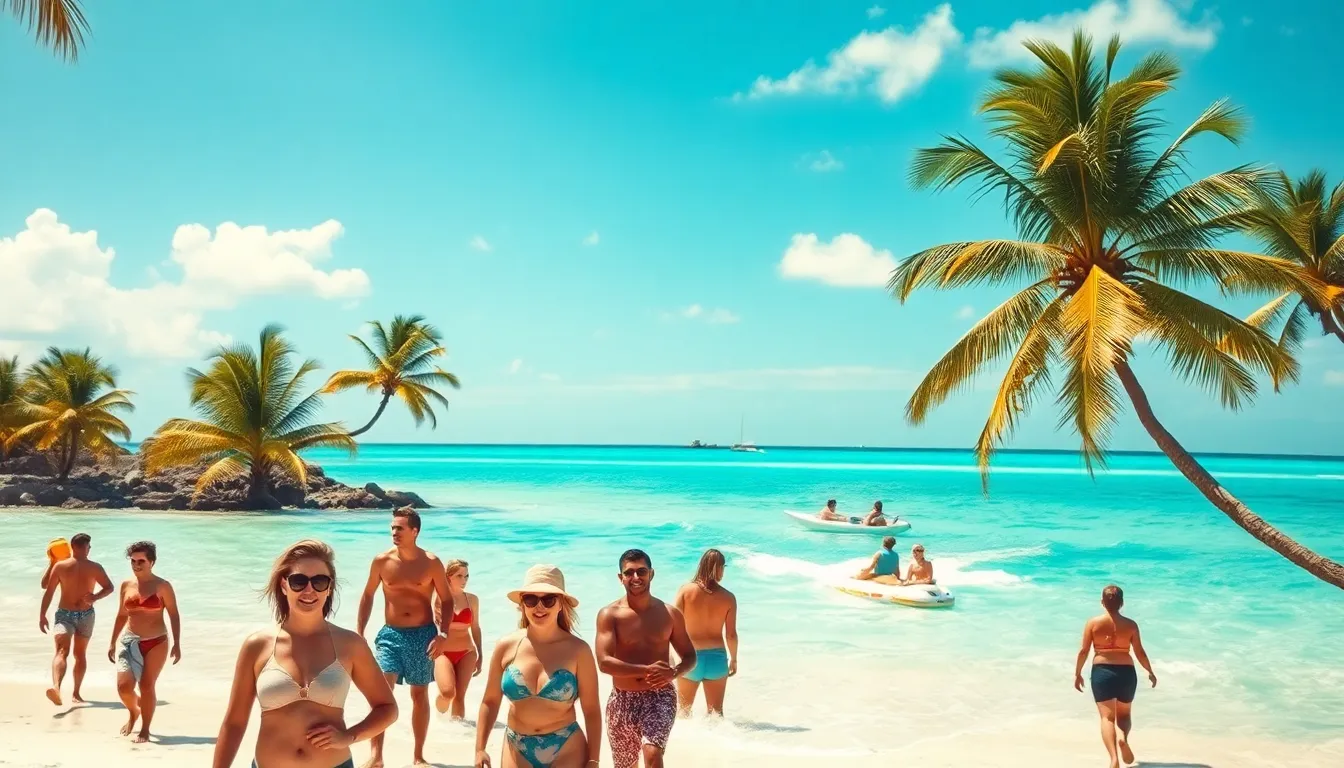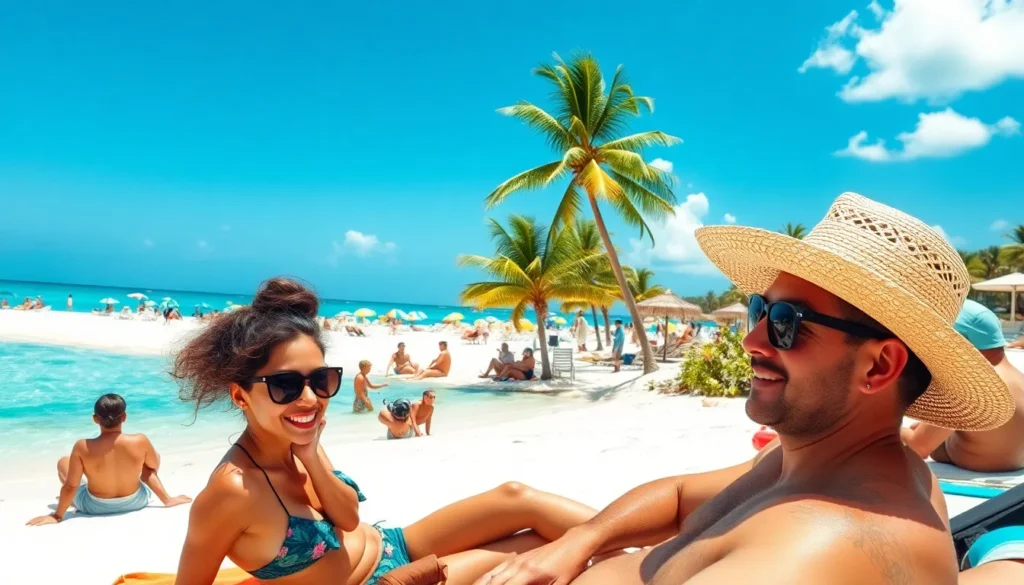Picture this: white sandy beaches, crystal-clear waters, and a cocktail in hand—sounds like paradise, right? But before you start packing your bags for a trip to the Bahamas, there’s a burning question that needs answering: is the Bahamas a US territory? Spoiler alert: it’s not.
While many dream of basking in the Bahamian sun, it’s essential to understand the political landscape. The Bahamas is an independent nation, not a playground for Uncle Sam. So, if you’re planning to visit, you’ll need more than just a passport and a sun hat. Dive into the details and discover why this tropical haven stands proudly on its own, and what that means for your next getaway.
Table of Contents
ToggleOverview of The Bahamas
The Bahamas consists of over 700 islands, cays, and islets in the Atlantic Ocean. This archipelago lies approximately 50 miles off the southeastern coast of Florida. Visitors enjoy its crystal-clear waters and vibrant marine life. The nation features diverse ecosystems, including coral reefs and subtropical forests.
Independence from British colonial rule was achieved on July 10, 1973, marking a significant milestone in its history. The Bahamas operates as a parliamentary democracy, maintaining a political system guided by the principles of a constitutional monarchy. The British monarch remains the ceremonial head of state, while the Governor-General represents the monarch on the islands.
Tourism plays a crucial role in its economy, providing job opportunities and generating significant revenue. With over 6 million visitors annually, attractions range from luxurious resorts to historic sites. Popular activities include snorkeling, scuba diving, and relaxing on stunning beaches.
Cultural influences are rich, reflecting African, European, and indigenous heritage. Bahamian music, art, and festivals celebrate this blend, highlighting the unique identity of the nation. Additionally, the official language is English, making communication easy for American travelers.
Overall, understanding the full scope of The Bahamas helps travelers appreciate its independent status and cultural richness. Travelers preparing for a trip also need to consider the necessary documents for entrance, as the political alignment differs from U.S. territories.
Historical Background

The Bahamas has a rich history that shaped its current identity as an independent nation. Colonization and cultural influences played significant roles in this development.
Colonization and Independence
The Bahamas became a British colony in 1718, marking the beginning of foreign rule. Following centuries of colonial governance, frustration and a desire for self-determination emerged among Bahamians. Independence was achieved on July 10, 1973, transforming the nation into a sovereign republic. Today, this independence is reflected in its parliamentary democracy and constitutional monarchy, where the British monarch serves as a ceremonial head of state.
Relationship with the United States
The proximity of the Bahamas to the United States fosters a close relationship. The islands sit approximately 50 miles off Florida’s coast, promoting tourism and economic interactions. Many Americans frequent the Bahamas for its beautiful landscapes and recreational activities. Cultural exchanges occur regularly, influencing various aspects like music and cuisine. The diplomatic ties between the two nations emphasize cooperation in trade, security, and tourism, enhancing the Bahamas’ global standing.
Territorial Status of The Bahamas
The Bahamas is an independent nation, not a US territory. Achieving independence on July 10, 1973, marked a significant milestone in its history. This independence reflects its sovereignty and government structure, which operates as a parliamentary democracy under a constitutional monarchy. The British monarch serves as the ceremonial head of state, emphasizing the nation’s distinctive political identity.
Sovereignty and Independence
Sovereignty defines the Bahamas as a nation free from foreign control. This status allows the country to establish its laws, govern its affairs, and engage in international relations. Independence from British colonial rule paved the way for political self-determination. Numerous national celebrations honor this independence, showcasing pride in Bahamian heritage and culture. Citizens play a vital role in shaping their government through elections and civic engagement.
Comparison with Other Territories
When comparing the Bahamas to US territories like Puerto Rico and Guam, distinct differences emerge. Territories often remain under US governance, lacking full sovereignty. The Bahamas, on the other hand, operates independently and controls its political destiny. Taxation and legal systems in US territories differ from those in the Bahamas, reinforcing its unique status. Understanding these differences is essential for travelers and those interested in the geopolitical landscape of the Caribbean.
Impact on US-Bahamas Relations
US-Bahamas relations significantly benefit from shared geographical proximity. The Bahamas, located about 50 miles from Florida, fosters robust tourism exchanges. Over 6 million visitors travel from the US to the Bahamas annually, boosting both economies.
Trade agreements enhance economic ties between the two nations. Joint efforts address mutual interests, particularly in security and economic development. The Bahamas collaborates with the US in areas such as drug interdiction and immigration control.
Cultural exchanges enrich the relationship. Influences from music, cuisine, and festivals reflect intertwined histories. Both countries celebrate various events that commemorate shared values and heritage.
Diplomatic relations have strengthened since the Bahamas gained independence in 1973. Both nations maintain diplomatic missions that facilitate communication and cooperation. Such connections allow for discussions on various issues, including environmental protection and tourism policies.
Understanding the Bahamas’ independence clarifies its stance in international relations. While it engages with the US, it maintains sovereignty, allowing for independent decision-making. This autonomy enables the Bahamas to navigate complex geopolitical landscapes effectively.
Active collaboration between the US and the Bahamas illustrates mutual respect and partnership. Joint ventures focus on uplifting the Caribbean region while promoting peace and stability. These ongoing relationships underscore the importance of recognizing the Bahamas as an independent nation within the broader global context.
The Bahamas stands as a vibrant independent nation with a rich cultural heritage and a strong sense of identity. Its sovereignty allows it to navigate international relations while fostering a close connection with the United States. This unique status enhances its appeal as a travel destination, offering visitors unforgettable experiences amidst stunning natural beauty. Understanding the Bahamas’ political landscape is essential for travelers, ensuring a smooth and enjoyable journey. As the Bahamas continues to thrive, its independence remains a cornerstone of its charm and allure.








